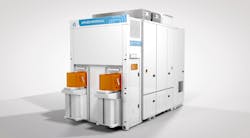Applied Materials Sees Surge for Non-Leading-Edge Chip Gear
Applied Materials signaled strong sales and profits in the quarter ahead, buoyed by strong demand for its chip-making equipment—and specifically, tools for 28-nm and larger process nodes—amid an ongoing shortage.
The Santa Clara, California-based company said revenue would be about $6.3 billion in its fiscal fourth quarter. Overall profits will be $1.87 to $2.01 per share for the three-month period ending in October.
Most of the world's largest semiconductor firms have been scrambling to add more production capacity, flooding Applied Materials with orders. A deluge of demand in recent months has led to unprecedented shortages of a wide range of chips. The crisis is unlikely to end soon. CFO Dan Durn said its order backlog is close to $10 billion, with record levels in its chip-making gear business and growth across all its geographies.
The company's sales rose by 41% over the third quarter to $6.2 billion. Applied Materials has been buoyed by strong orders from its top customers—Samsung, TSMC, and Intel—which are locked in a race to roll out chips based on the world's most advanced chips with smaller, faster, and more efficient transistors. Applied Materials said its core semiconductor business posted sales of $4.45 billion, the highest ever for the segment.
Applied Materials has long been the world's largest maker of semiconductor gear used in fabs, turning its quarterly results into a bellwether for the long-term spending plans at some of the chip industry's biggest names.
But the company said only around 50% of its sales of semiconductor equipment came from tools targeted at the most advanced logic chips. The other half of its business came from tools used to create specialty chips, including power management ICs for smartphones as well as image sensors, microcontrollers (MCUs), and other parts used in cars or on factory floors. These are based on all but the three most advanced nodes in the industry.
While consumer electronics giants have been able to source many of the most advanced chips in their devices, they have been grappling with shortages of power management ICs, radio-frequency ICs, display driver ICs, and other types of chips that are based on legacy process nodes. Apple has warned that its inability to buy many of these secondary parts will start to impact the production of iPhones and iPads in the second half of the year.
These chips are generally mass-produced on mature nodes such as 45-, 90- and 180-nm that are also widely used in automobile-grade chips. Many of these chips are manufactured in 200-mm chip fabs that have been overloaded with orders, forcing automakers to compete with the consumer electronics giants for scarce chip supplies. Even if you have everything else, a single chip can delay the production of a device if it's out of stock.
Applied Materials said sales of machinery used in 28-nm and larger nodes are on track to double in 2021.
The global chip shortage has dragged on for months at this point, ravaging the electronics supply chain. A rise in demand for game consoles, personal computers, and other consumer electronics has depleted the supply of chips to the automotive segment, resulting in many chips becoming harder to buy or more costly. Intel CEO Pat Gelsinger and other industry executives have warned the supply crunch could last into 2022 and possibly 2023.
There is no short-term fix for the situation. Tools made by Applied Materials and other equipment vendors can cost tens of millions of dollars each and take months to build and ship to customers, on top of the time it takes to install and test them on production lines. Customers tend to place orders with Applied Materials and other firms months in advance to stay ahead of demand. But they have been playing catch-up for months, and the chip-making tools being built today will likely not add to the industry's output for months.
Applied Materials said demand for its most advanced gear as well as its legacy machinery is more sustainable than it once was as electronic devices get smarter and, as a result, are loaded with more advanced chips. The Silicon Valley giant has previously said that it sees the global market for semiconductor gear growing to more than $70 billion in 2021 and then again to $90 billion in 2022.
"Demand for semiconductors is no longer about one or two killer applications," said Greg Dickerson, the CEO of Applied Materials, on a conference call with analysts last week. "Digital transformation is built on silicon."
Applied Materials said third-quarter profits more than doubled to $1.72 billion, or $1.87 per share, up from 91 cents per share a year earlier. The company's gross margins also improved from 44.5% a year ago to 47.9%.
About the Author
James Morra
Senior Editor
James Morra is the senior editor for Electronic Design, covering the semiconductor industry and new technology trends, with a focus on power electronics and power management. He also reports on the business behind electrical engineering, including the electronics supply chain. He joined Electronic Design in 2015 and is based in Chicago, Illinois.

